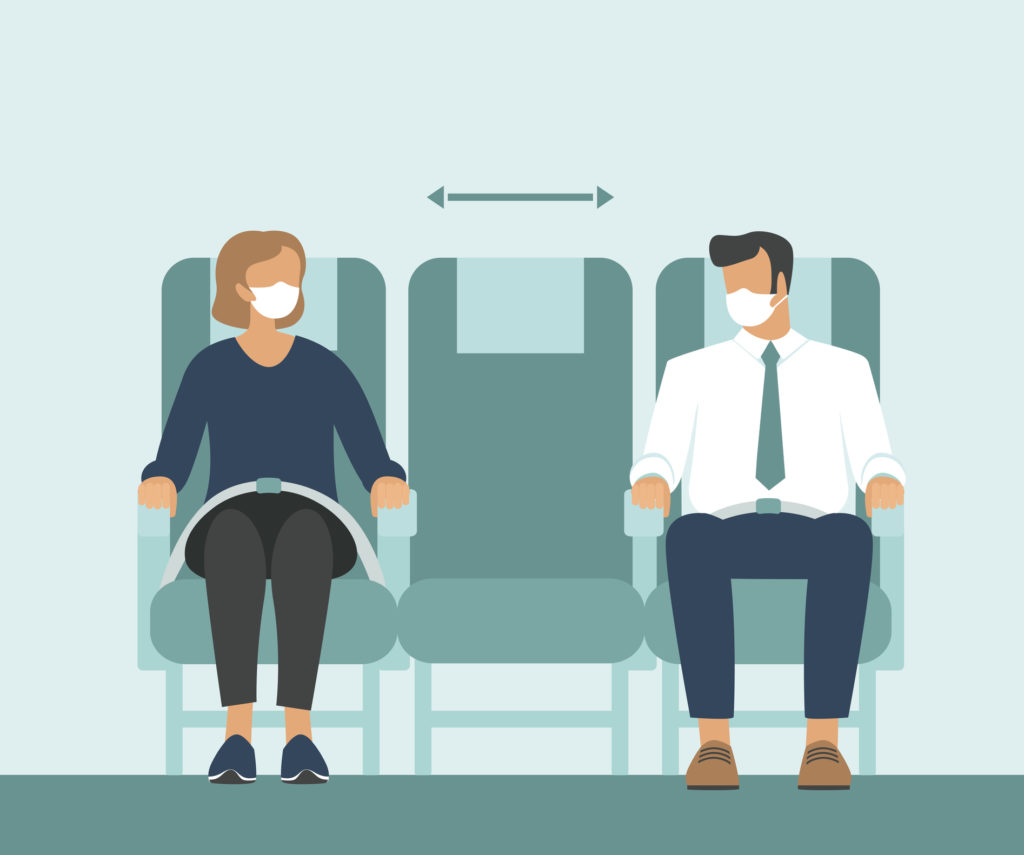COVID-19: Are some airplane seats safer than others?
Signing up for credit cards through partner links earns us a commission. Terms apply to the offers listed on this page. Here’s our full advertising policy: How we make money.
Whether out in public or boarding a flight, the more we come into contact with each other, the higher the risk for viral transmission. So, it may seem obvious that during a pandemic you’re safest if you stay home. The Centers for Disease Control says that “staying home is the best way to protect yourself and others from getting sick.”
But if you have to travel there are ways to go about with safety top of mind. By now, we all know how important it is to wear a mask, physically distance from each other and frequently wash or sanitize our hands. That all goes into play when traveling, too. Here are some considerations for protecting yourself from COVID-19 on a plane.
What’s the safest seat on an airplane right now?
While it may be considered one of the safest seats on an airplane in the event of a crash, the middle seat is certainly not the best choice during a pandemic.
“The ventilation in airplanes is such that recirculated air is confined to a few rows,” said Dr. Leann Poston, physician and medical writer. “Avoiding the middle seat is a great idea. Sitting only with members of your social group in your row will also decrease risk.”
Dr. Poston also recommends turning on your seat’s overhead air vent to keep the air circulating. “This will decrease the concentration of viral particles in the vicinity,” she said.
With social distancing in mind, the further away from people on an aircraft, the better. If possible, try and find a row with no other passengers. If you see an empty row you can try and request a new seat from a flight attendant.
Alaska, Delta, Hawaiian, Jetblue and Southwest are all blocking middle seats in the near future to allow for more social distancing on airplanes.
Vincent Racaniello, a virology professor at Columbia University, told Esquire that a window seat can be a safer option since you’re better able to avoid passengers walking up and down the aisle.

How to protect yourself from COVID-19 during a flight
The future, it seems, is here. Disinfecting robots are now cleaning airports with ultraviolet C light. The boarding process has been sped up using touchless technology and some flight attendants don full-body PPE uniforms looking ready for the apocalypse.
Just as airports are taking safety steps, many airlines are taking their own precautions. But there are things you can do to protect yourself from COVID-19 during a flight, too.
What are the best practices to protect yourself from COVID-19 during a flight
“From a medical perspective, I feel like flying is an average-risk activity,” says Poston. “Of course, each person needs to weigh the risks and benefits for themselves and they might find the benefits far outweigh the risks. For example, seeing family members that live in another state.”
According to the CDC, due to the circulation and filtration of air on planes, most viruses don’t spread easily on flights. The more distressing element of air travel involves long security and terminal lines and crowded flights, which can make it tough to stay distant from one another.
“Since it is impossible to maintain any kind of distance from other people in a plane, social distancing is impossible,” Poston said. “But planes do have air circulation and filtration systems to minimize the risk of infection.”
Traveling with children? “Everyone should wear a mask, except children under the age of two, to cover their mouth and nose,” said Poston. “Young children like to touch everything. Having hand sanitizer available and keeping their hands busy may help them keep from touching their faces.” You could also consider giving a child something to carry or instructing them to keep their hands in their pockets until you are seated on the plane, according to Poston.
And if you’re the kind of person who likes to board the plane first to claim overhead bins and get settled, Poston said don’t rush to be first on the plane. “Sitting on the tarmac with no air movement is the highest risk, period.”
Wear glasses to cover your eyes, use hand sanitizer to keep your hands clean and do not touch your face.
“Knowing the COVID viral particles need to get on your eyes, or in your nose or mouth to infect you; there are ways to decrease your risk,” said Poston.
10 safety tips for the cautious traveler
Before your flight, keep these tips in mind:
- Get a small, TSA-compliant bottle of hand sanitizer to use on the plane, not before.
- Put disinfecting wipes in a plastic zippable bag to carry on the plane.
- Bring a set of clothes in your carry-on bag to change into when you get off the plane.
- When in the airport try to touch as few surfaces as possible.
- After you get through security wash your hands.
- Try to maintain social distance, wear a mask, and don’t touch your face at the airport.
Once on the plane:
- Use your disinfecting wipes to wipe the surfaces you will touch. When you are done, use the hand sanitizer.
- When you get off the plane wash your hands, change your clothes and then rewash your hands. Pick up your luggage. Wipe the luggage with the wipes and then wash your hands before you leave the airport.
- Bring your own snacks. Buy drinks at the airport before entering the plane so you can wash the containers.
- Hand sanitizer and washing your hands is a better choice than wearing gloves.
“People with medical conditions that put them at higher risk from complications of COVID may find the risks [of traveling] far outweigh the benefits,” said Poston. “Traveling by car and train also has risks and benefits. Car accidents, for example, occur at a much higher rate than a plane or train accident.”
Bottom line
Airline travel during the pandemic isn’t for everyone, but given certain precautions, risk can be managed. That said, plans should be changed when illness strikes. If you feel sick before your planned travel, stay home except to get medical care.
Editorial Note: We're the Million Mile Secrets team. And we're proud of our content, opinions and analysis, and of our reader's comments. These haven’t been reviewed, approved or endorsed by any of the airlines, hotels, or credit card issuers which we often write about. And that’s just how we like it! :)






Join the Discussion!